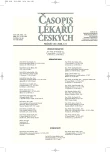Prediction and Monitoring of Severe Acute Pancreatitis
Predikce a monitorace těžké akutní pankreatitidy
U 20–30 % nemocných s akutní pankreatitidou se vyvine těžká forma onemocnění (TAP) s vysokou mortalitou a morbiditou. Biochemické markery mohou časně diagnostikovat rozvoj TAP. Přehledový článek krátce komentuje klinickou využitelnost jednotlivých ukazatelů rozvoje TAP. Řada biochemických ukazatelů může předikovat rozvoj TAP s různou specificitou a senzitivitou. Dle současných výsledků je přínosné při přijetí vyšetření sérového prokalcitoninu a z moči stanoveného trypsinogen aktivačního peptidu. Sérové hladiny interleukinu -6 a -8 během 24 hodin od přijetí a po 48 hodinách od přijetí stanovení C-reaktivního proteinu. Vhodné je denní stanovení sérové hladiny prokalcitoninu.
Klíčová slova:
těžká akutní pankreatitida, monitorace, diagnostika.
Authors:
R. Gürlich 1,2; P. Maruna 2; J. Špičák 3
Authors‘ workplace:
Klinika transplantační chirurgie IKEM, Praha
1; Ústav patologické fyziologie 1. LF UK, Praha
2; Klinika hepatogastroenterologie IKEM, Praha
3
Published in:
Čas. Lék. čes. 2006; 145: 437-441
Category:
Review Article
Overview
Twenty to thirty percent patients with acute pancreatitis develop severe acute pancreatitis with high mortality and morbidity rate. Markers of severity of acute pancreatitis are clinically important for the early diagnosis of complications. We reviewed the literature for markers of acute pancreatitis. on their relevance for prediction of severe pancreatitis are given. Several markers can predict severe cases of acute pancreatitis with a different positive and negative predictive value. Useful predictors of severity may include serum procalcitonin and urinary trypsinogen activation peptide at the admission, serum interleukins-6 and -8 at 24 h, and serum C-reactive protein (CRP) in 48 hours interval. The valuable marker for daily monitoring appears to be serum procalcitonin.
Key words:
severe acute pancreatitis, monitoring, diagnostic.
Labels
Addictology Allergology and clinical immunology Angiology Audiology Clinical biochemistry Dermatology & STDs Paediatric gastroenterology Paediatric surgery Paediatric cardiology Paediatric neurology Paediatric ENT Paediatric psychiatry Paediatric rheumatology Diabetology Pharmacy Vascular surgery Pain management Dental HygienistArticle was published in
Journal of Czech Physicians

- Possibilities of Using Metamizole in the Treatment of Acute Primary Headaches
- Metamizole at a Glance and in Practice – Effective Non-Opioid Analgesic for All Ages
- Advances in the Treatment of Myasthenia Gravis on the Horizon
- Metamizole vs. Tramadol in Postoperative Analgesia
- Spasmolytic Effect of Metamizole
-
All articles in this issue
- Meckel’s Diverticulum
- Capsule Endoscopy – The Past, Presence, and Future
- Prediction and Monitoring of Severe Acute Pancreatitis
- Fatty Liver Disease and Statins – Which Discipline the Problem Belongs To?
- Hyperamylasemia, Laboratory and Clinical Aspects
- Different Views on the Association between Cannabinoids and Cancer
- Injury of the Scapholunate Interosseal Ligament – Scapholunate Dissociation
- Changes in Serum and Adipose Tissue Fatty Acid Composition after Low Calorie Diet with Respect to Dietary Fat Content in Obese
- Changing Clinical Image of Celiac Sprue in Childhood
- Hereditary Forms of Colorectal Adenomatous Polyposis
- Faecal Elastase I. Assessment – Its Use in Diagnosis of Chronic Pancreatitis
- Evaluation of DHPLC Analysis for Mutation Detection in Haemophilia A
- Paraneoplastic Encephalitis
- Patient’s Human Dignity and the Health Care
- Risk of Alcohol Abuse in Adolescence
- Journal of Czech Physicians
- Journal archive
- Current issue
- About the journal
Most read in this issue
- Faecal Elastase I. Assessment – Its Use in Diagnosis of Chronic Pancreatitis
- Injury of the Scapholunate Interosseal Ligament – Scapholunate Dissociation
- Hyperamylasemia, Laboratory and Clinical Aspects
- Capsule Endoscopy – The Past, Presence, and Future
